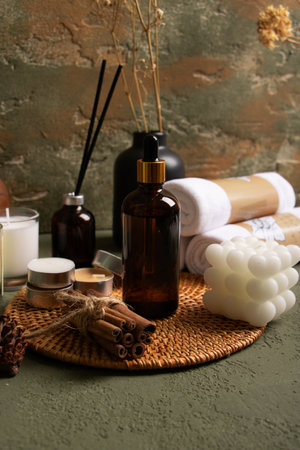1. Introduction to the British Home Apothecary
In the heart of British culture lies a long-standing tradition of turning to nature’s larder for gentle remedies and everyday wellbeing. The concept of a home apothecary, once a staple in many British households, draws on centuries of folk wisdom—where herbal teas soothed sore throats and pantry staples doubled as first aid. Today, with renewed interest in natural wellness and sustainability, setting up your own British home apothecary offers both practical benefits and a comforting connection to heritage. Creating a personal collection of natural remedies empowers you to care for your family’s health using time-honoured ingredients while fostering mindfulness around what goes into your body. Whether you’re interested in easing common ailments or simply seeking to enrich your daily routine with wholesome traditions, this guide will walk you through the essentials of establishing a well-equipped, British-inspired home apothecary.
Essential Tools for Your Apothecary
Building your own British home apothecary begins with assembling the right set of tools. These essentials help you prepare, measure, and store your remedies safely and effectively. Below, youll find a handy guide to the most important equipment, along with tips on sourcing quality items locally in the UK.
Key Equipment for Every Home Apothecary
| Tool | Purpose | Where to Source in the UK |
|---|---|---|
| Pestle and Mortar | Grinding herbs and seeds to release their natural oils and flavours. | Local kitchenware shops, traditional markets, or heritage brands like Mason Cash. |
| Digital Scales | Accurate weighing of dried ingredients for consistent results. | High street retailers (Argos, John Lewis) or specialist online suppliers. |
| Glass Jars with Lids | Storing dried herbs, teas, and infused oils while keeping them fresh. | Sustainable shops, supermarkets (Waitrose, Sainsbury’s), or eco-friendly outlets. |
| Tincture Bottles (Amber Glass) | Preserving homemade tinctures and herbal extracts away from sunlight. | Apothecary suppliers like Baldwins, Neal’s Yard Remedies, or online platforms such as Etsy UK. |
| Measuring Spoons | Ensuring precise measurements of both dry and liquid ingredients. | Kitchen sections of department stores or independent cook shops. |
Sourcing Tips for Quality Tools in Britain
Support Local: Whenever possible, opt for local artisans or small businesses who offer handcrafted or sustainably produced items. Not only does this help the community, but it also ensures you’re receiving unique, durable tools.
Seek Heritage Brands: British brands with a long tradition in kitchenware often provide excellent quality—look out for names like Kilner for jars or Mason Cash for pestle and mortar sets.
Sustainability Matters: Choose glass over plastic where possible and look for products that emphasise reusability and environmental friendliness.
Second-Hand Finds: Charity shops and car boot sales can be treasure troves for vintage apothecary tools at a fraction of the price.
Online Communities: Join British herbalist forums or Facebook groups—members often share recommendations or even swap spare supplies.
Caring for Your Apothecary Tools
A little care goes a long way. Wash glass jars and bottles thoroughly before use; sterilise them by boiling if you’ll be storing tinctures. Keep scales calibrated and store all tools in a clean, dry place. With the right equipment—sourced mindfully—you’ll be well on your way to crafting nourishing remedies in true British style.
![]()
3. Selecting and Storing Ingredients
When it comes to creating your own British home apothecary, sourcing high-quality ingredients is key for both safety and effectiveness. Start by seeking out reputable suppliers who specialise in organic or ethically sourced herbs and spices. Many local health food shops across the UK, as well as established online retailers, offer a wonderful selection of dried botanicals, roots, and resins suitable for home remedies. Don’t overlook British-grown options like chamomile, nettle, elderflower, and mint—these can often be found at farmers’ markets or even grown in your own garden.
Choosing Quality over Quantity
Select only what you’ll use within six months to a year, as freshness matters greatly for potency. Look for herbs that are vibrant in colour and aromatic, steering clear of anything musty or faded. When buying in bulk, request information about harvest dates and origins to ensure you’re getting the best available stock.
Proper Storage Solutions
The famously changeable British weather can play havoc with your ingredients if not stored correctly. Moisture and light are the main culprits when it comes to spoilage. Store your herbs and spices in airtight glass jars with secure lids; amber or green glass is ideal for protecting against sunlight. Label each jar clearly with the name and purchase date so you can keep track of freshness.
Ideal Storage Locations
A cool, dry cupboard away from direct sunlight and radiators is perfect. If space allows, dedicate a small shelf or drawer exclusively to your apothecary supplies to avoid cross-contamination with culinary ingredients. For those living in particularly damp homes, consider using silica gel packets (kept safely out of reach of children) to absorb excess moisture.
Extra Tips for the British Climate
During humid spells or winter dampness, check your jars regularly for any signs of condensation or mould. Herbs that feel soft or clump together may need to be replaced. Remember that certain fresh ingredients—like ginger root or garlic—are best stored in the fridge but should be kept separate from dried items to prevent moisture transfer.
By investing care into how you select and store your ingredients, you’ll ensure your home apothecary remains a reliable source of natural support throughout the British seasons.
4. Basic Ingredients to Get You Started
When stocking your first British home apothecary, choosing the right ingredients is key. Many classic staples have been trusted for generations in the UK for their gentle effectiveness and versatility. Here’s a guide to some essential ingredients you’ll want on hand, along with their typical uses in everyday wellness routines.
| Ingredient | Common Uses |
|---|---|
| Chamomile | Known for its calming properties, chamomile is a staple in bedtime teas and soothing skin compresses. It’s widely used to support sleep, ease digestive discomfort, and calm mild skin irritations. |
| Elderflower | This delicate flower is a classic remedy for colds and seasonal sniffles. Elderflower can be brewed as a tea or made into cordial to help soothe sore throats and promote natural sweating during fevers. |
| Lavender | Loved for its gentle floral scent, lavender is often added to homemade balms, bath sachets, and sleep pillows. Its relaxing aroma helps ease tension and promote restful sleep while its oil can soothe minor burns or insect bites. |
| Local Honey | A true British favourite, local honey not only sweetens herbal teas but also brings gentle antibacterial properties. It’s commonly used for soothing sore throats, supporting seasonal allergies, and aiding wound healing when applied topically. |
These foundational ingredients are easy to find at British health shops, local markets, or even grown in your own garden. By keeping them stocked in your home apothecary, you’ll be well-equipped to blend simple remedies that reflect both tradition and natural wellbeing.
5. Safe and Sustainable Practices
When creating your British home apothecary, it’s essential to adopt safe and sustainable habits from the very beginning. This not only protects you and your loved ones but also ensures that your herbal journey remains harmonious with the environment and local traditions.
Guidelines for Safe Use
Always take care when using herbs and remedies, especially if you are new to herbalism. Start by familiarising yourself with each herb’s properties, recommended dosages, and any possible interactions with medications or allergies. Reliable British resources such as the NHS website or reputable herbal books can guide you. When in doubt, consult a qualified medical herbalist before trying anything new. Proper labelling of jars and containers is vital—make sure every ingredient is clearly identified with its name and date of storage to avoid confusion.
Responsible Sourcing
For your apothecary, try to source herbs ethically and responsibly. Whenever possible, choose organic and UK-grown produce from trusted suppliers or local markets. This supports local farmers and reduces your carbon footprint. Avoid buying endangered or over-harvested plants, and check that suppliers follow fair trade and sustainability standards.
Sustainable Storage Solutions
Opt for reusable glass jars, tins, or ceramic containers instead of plastic to store your ingredients safely while keeping them fresh. Store all items away from direct sunlight, dampness, and heat to preserve their potency. Remember to rotate your stock regularly to use up older ingredients first, minimising waste.
Growing Your Own Herbs
If you have a garden, window box, or even a sunny kitchen windowsill, growing your own herbs is one of the most rewarding—and sustainable—ways to stock your apothecary. Classic British favourites like mint, chamomile, rosemary, thyme, and lavender thrive in UK climates. Growing your own means you know exactly how your herbs have been cultivated—no pesticides or mystery chemicals involved.
Foraging Responsibly in the UK Countryside
The British countryside offers a wealth of wild herbs such as nettle, elderflower, or hawthorn. Foraging can be both delightful and sustainable if done carefully: always positively identify plants before picking (using trusted field guides), only take what you need (never more than a third of what’s available), avoid protected areas or rare species, and respect landowners’ rights by seeking permission where necessary. The Woodland Trust and Plantlife offer excellent advice on ethical foraging in the UK.
Embracing Natural Balance
By following these simple guidelines for safety and sustainability, you’ll nurture a home apothecary that honours both your wellbeing and the natural world around you—a truly British approach rooted in respect for tradition and the environment.
6. Simple Remedies for Everyday Ailments
Once your British home apothecary is stocked with the basics, you can begin crafting gentle, time-honoured remedies for common complaints. These easy-to-make blends rely on ingredients that are both accessible and familiar within the UK, making it simple to support your wellbeing naturally.
Soothing Herbal Tea for Colds
When sniffles or a sore throat strike, a warming tea can bring comfort. Try combining dried elderflowers, peppermint, and a slice of fresh ginger in a teapot. Pour over boiling water and steep for 10 minutes. Elderflower supports immunity, while peppermint helps clear congestion and ginger offers a gentle warmth. Add local honey if desired for extra soothing.
Calming Chamomile Digestive Infusion
For indigestion or after heavy meals, chamomile tea is a classic remedy. Steep dried chamomile flowers—easily found in British health shops or grown at home—in freshly boiled water for 5-7 minutes. Chamomile not only aids digestion but also has calming properties to help ease an unsettled tummy.
Lavender Stress Relief Bath
After a long day, a lavender bath can help melt away tension. Add a handful of dried lavender flowers or a few drops of lavender essential oil to your bathwater. Lavender is widely grown across Britain and valued for its ability to soothe the mind and body, encouraging restful sleep and relaxation.
Gentle Oatmeal Skin Soak
If you’re experiencing irritated or dry skin, an oatmeal soak is a simple remedy. Place a cup of rolled oats into a muslin cloth, tie securely, and drop into warm bathwater. The oats gently nourish and soften the skin—a traditional British approach to caring for sensitive skin naturally.
A Few Words on Safety
While these formulas are gentle, always patch test new remedies and consult your GP if you have ongoing health concerns or are taking medication. Home apothecary traditions in Britain emphasise working with nature’s gifts mindfully—start simply, listen to your body, and enjoy the process of supporting your health the natural way.


